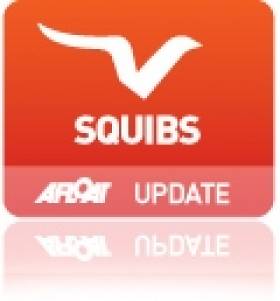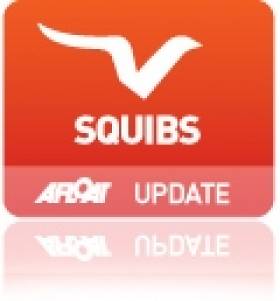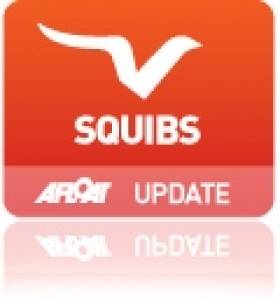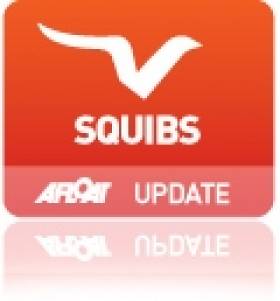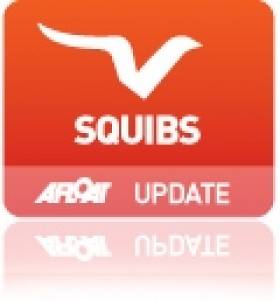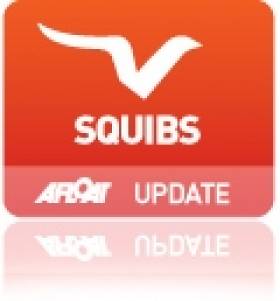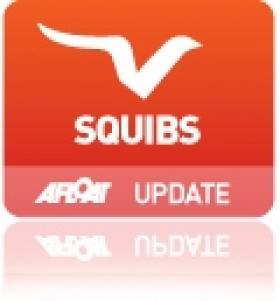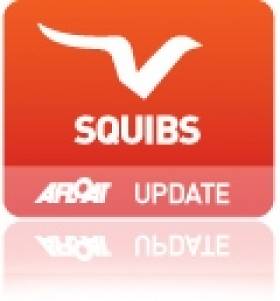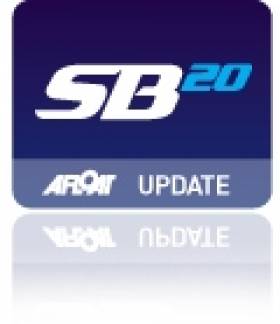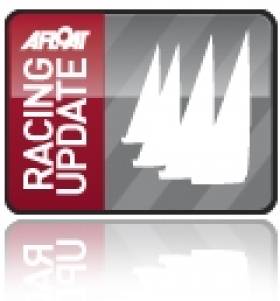Displaying items by tag: squib
Lough Derg's Irish Squib Inland Championships Attracts Big Turnout
#squib – Lough Derg Yacht Club in Tipperary was busy in 2013. This Club on the River Shannon held the Mirror World Championships in August, and one of the biggest Irish one-design keelboat regattas of 2013 with 80 boats competing, on the weekend of 18th - 20th October, with fleets of Dragons, SB20s and National Squibs as well as handicap racing for a cruiser fleet.
The National Squib fleet had a very strong entry of 29 boats from Cultra on Belfast Lough (4), Dublin Bay (10), Glandore (2), Howth (2), and Kinsale (4), Killilea(1), as well as the home Dromineer fleet (4).
On Saturday, PRO Geoff Donoghue laid a short windward leg, a long spinnaker reach to an outer loop with 2 downwind legs and one upwind leg in Youghal Bay. The wind was shifty and varied from force 1-2 on beautifully flat water. Race 1 went to current National Champion from Kinsale, James Matthews and Rob Jacob in 51, 'Mucky Duck' from Howth's husband/wife team Jonathan and Hazel Craig in 37, 'Kerfuffle' and Gordon Patterson and Ross Nolan in 820 'Quickstep III'.
Race 2 was won by 'Kerfuffle' followed by 'Mucky Duck' and Cian O'Regan in 100, 'Fagan' which really is the quickest boat in the fleet. Race 3 was won by East Coast Champion Fergus O'Kelly in 223, 'Selik' from 'Quickstep III' and Peter and Marie Dee from Royal St. George Y.C. in 813 'Kookaburra'. It was becoming evident at this stage that a good start on the short windward leg was vital to achieving a good finish.
Race 4 was won by 'Kookaburra' from Frank Whelan and Brian Hare in 46, 'Lola'.
Remarkably, a long days racing in shifty winds had produced three different winners.
Dinner for 200 competitors in the Club was followed by craic in the 'Whisky Still' which resulted in some competitors not being fit to sail on Sunday. On Sunday, a stronger wind blew from the south, so a course was laid between Dromineer Bay and The Mountaineer buoy. The squibs sailed a conventional windward leeward course. The race was won by Colm Dunne in the beautifully prepared 134, 'Allegro' from Vincent Delany and Mary Mc.Loughlin in 24, 'Femme Fatale' from son and father team Tim and Derek Jago in 798, 'Why Not'. It is possible that this was the most competitive Squib event in Ireland this year, with all boats discarding high scores. In fact many had two high scoring races which pushed them down the results board. No fleet dominated the event, although the Kinsale fleet seems strongest, while Dun Laoghaire, Howth, Cultra were all achieved top 5 places.
Such a good turn out of boats begs the question....Should the National Championships be held in Dromineer in the Autumn? This is the great unanswered question, but we do know that there will be more than 30 boats competing in this fun filled event next year.
For results see below.
#squib– The First Annual Squib Cruise left Dun Laoghaire harbour mouth about 15 minutes late heading south. There was a Met Eireann small craft warning in place. The Squibs agreed before departure that no spinnakers would be flown, and that crews would keep in regular radio communication on VHF, and nobody should race ahead of the others. The distance to be sailed was 20km. south to the new marina at Greystones, Co. Wicklow.
Fourteen boats took part, Vincent Delany, Joe O'Byrne and Julianne in 'Femme Fatale'(24), Jill Fleming and Mary Mc.Gloughlin in 'Perfection' (44), Noel and Zina Colclough and Richard in 'Perequin'(48), Sheila Power and Gilly Fletcher in 'Little Demon' (95), Dermot O'Neill and his brother in 'Glassilaun' (870), Pete and Anne Evans in 'Anemos' (832), Fergal Gaynor and Eddie McCarron in 'Aija', and Conor O'Leary and his wife in 'Summer Wine' (14). As they left Dun Laoghaire they were quickly followed by cruisers 'Bendemeer', 'Birmayne', and 'Terriblee' and 'Lucy O' and two Dragons.
The route took the ladies crews past the Forty Foot bathing place, with an ebb tide and wind force 3 from astern. As they passed through Dalkey sound, they admired the expensive houses and made interesting observations about their owners. Although the wind went light in the Sound, the ebb tide swept them through. They crossed beautiful Killiney Bay with the wind abeam. There were occasional gusts of strong winds from the West. There was no maritime activity visible at the town of Bray. With Bray Head abeam, the wind went light, and heavy, from this direction and then that direction- but it wasn't a race so it didn't matter. Then it was the final straight to the new harbour at Greystones, an hour and three quarters after leaving Dun Laoghaire.
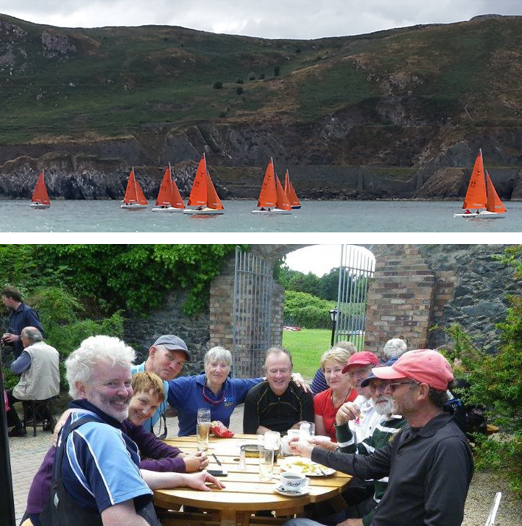
(Top) Passing Bray Head and (above) Squib crews enjoy lunch outdoors at the Beach House beer gardens in Greystones in County Wicklow, next door to the new marina
Gillian Fletcher (Class captain) led the parade of tan sailed boats into the harbour followed by Greystones residents, Pete and Anne Evans. The boats were handled with great alacrity through the marina entrance, in such gusty conditions, and the Squibs were berthed on the innermost trot. 'Femme Fatale' was dressed all over in a motley array of random flags, 'Anemos' was decorated with her much travelled battle flag- 'Gunther', and 'Birmayne' had the largest swallow-tailed Rear Commodore's Burgee you have ever seen. They really livened up the look of the marina.
It was time to head ashore for lunch and some pints in the beer garden behind The Beach House.
Conversations covered every subject under the sun. Following lunch, some of the group headed to the ice cream parlours, where strawberries and ice cream were their speciality.
By 15.30hrs the tide was on the change, so the Squibs headed back to their boats, for the return trip. The wind was still blowing force 3 but it had veered to the north east. The trip back took two hours and was relatively uneventful.
Next year the Squibs plan on sailing to Malahide, where they will lunch in Gibneys.
Kinsale Boats Top Squib Nationals
#squibs – Local boats topped a 31–boat Squib National Championship fleet in Kinsale over the bank holiday weekend with boats from Dun Laoghaire, Howth, Northern Ireland and Holyhead in Wales joining the Munster fleet.
First overall in the seven race, one discard series was Mucky Duck sailed by James and Bruce Matthews on 17 points with Kinsale club-mates Marcus and Meagan Hutchinson three points back in second overall. Third was Belfast Lough visitors, Toys for The Boys, sailed by Peter Wallace and John Driscoll from Royal North of Ireland YC.
Defending champions, the Royal St. George, Dun Laoghaire pairing of Aidan O'Connell and Ben O'Donoghue were 16th.
Download results as a a jpeg file below
Squib's Sheahan is Top of Class at Glandore Classic Regatta
#squib – With a string of first and second places, Dave Sheahan sailing Top Dee 686 was the winner of the Squib keelboat class but only after a tie break with Sean Thompson's Trojan at last week's Glandore Classic boat regatta in West Cork. Full results are downloadable below as a pdf file.
#squib – Hosted by the ever welcoming Howth Yacht Club on 22-23rd. June, this event was held in some of the heaviest wind conditions experienced for Irish Squib Championship Events, with wind from the west varying in strength from 18 knots to 36 knots.
A small but high class field of eleven boats took to the water for the second of the four Irish regional events for the Squib Class this season. The entry was disappointing for the organizers, with 6 boats from the host club, 2 visitors from the Royal North of Ireland Yacht Club, and only 3 visitors from the Dublin Bay Fleet in Dun Laoghaire.
With a forecast of 16-25 knot South-Westerlies, with sunshine and only occasional showers the fleet was understandably keen to get on the water and get the five race series started despite the distraction of the first Lions test on the TV in the Howth Yacht Club bar. Given the expected 35 knot breezes forecast for Sunday, PRO Rupert Jeffares wisely planned to get as many as 4 races sailed on the first day of the series, and with this in mind ran a series of 2 lap windward/ leeward courses in the steadily building winds.
Following his exceptional speed, and high pointing in the strong winds at the Baily Bowl in Dun Laoghaire some weeks before, there was expectation for Gordon Patterson and Ross Nolan in Quickstep III to run away with the event, but it was not to be.
Pre race plans on most boats seemed to focus on hitting the right hand side of the first beat, to take advantage of the strong ebb tide but this proved costly as a left hand shift saw Howth's Fergus O'Kelly and Jonathan Wormald in No.223 Selik, and Des Clayton & Paul Henry of the RNIYC sailing 794, Inismara and Vincent Delany & Paul Maguire of the RSGYC get to the windward mark off Portmarnock Beach first. Selik made use of the clear air at the front to extend his lead and took the bullet by an impressive margin from Delany in second and Jonathan Craig & Hazel Ruane sailing Kerfuffle in third.
The second race followed a similar pattern with the boats that went left from the start coming out on top. This time Delany, in 24 Femme Fatale, led from Craig in Kerfuffle in second. The closeness of the racing was clear to see, as both O'Kelly and 820 Quickstep III sailed by Gordon Patterson with Ross Nolan of the RNIYC, made large gains on the final downwind leg by staying uptide, to leave the top 4 neck and neck at the last leeward mark. The order was Kerfuffle, Quickstep III, Femme Fatale and Selik. At the finish only 150 meters away four consecutive hoots led to some confusion about the final positions, but the gun went to Femme Fatale from Kerfuffle, with Selik in third and Quickstep III fourth. The Finishing time between first and fourth finishers was no more than 10 seconds after almost one hour racing over two laps of the race course.
The third race was started in increasingly strong winds, with gusts of 36 knots recorded on the committee boat, and the conditions had begun to take their toll. By the first mark just seven boats remained. Delany/Maguire led from the right with O'Kelly/Wormald, Patterson/Nolan, Jill Fleming/ Conor O'Leary in Perfection 44 and Michael O'Connell/ Eddie McCarron in Tais 642 (Irish language word for damp) in hot pursuit. By the finish both O'Kelly and Delany were battling for the honours. They approached the finish line, Selik on starboard tack and Femme Fatale on port on a collision course. The latter tacked too early and as a result could not lay the finish mark, and had to gybe around leaving the podium position to her rival, with Patterson in third place and Fleming fourth. This manoeuvre was the critical one which won the Championship.
The PRO, Rupert Jeffares then made the sensible call to send the fleet to shore as winds continued to increase and gear failure put paid to a number of competitors. This left O'Kelly/Wormald (1, 3, 1) holding the overnight lead on countback from Delany (2, 1, 2) with Craig in third, Patterson fourth and Fleming fifth.
On Sunday the wind increased and conditions at Howth were unsailable, so the results of the first days racing stood.
Several things can be noted from this event, 1) Less boats are traveling to events, possibly due to traveling costs and to family commitments, 2) The Race Committee at Howth have all the skills and good judgement necessary to run the Squib UK National in 2015, 3) The Squibs are tough boats, well capable of handling whatever conditions are thrown at them, on condition that you man the pumps from time to time..
Results:
1st. Selik, No. 223 sailed by Fergus O'Kelly & Jonathan Wormald, of Howth Yacht Club
2nd. Femme Fatale, No.24 Vincent Delany & Paul Maguire of Royal St. George Yacht Club
3rd. Kerfuffle No. 37, Jonathan Craig & Hazel Ruane of Howth Yacht Club.
Silver fleet: Inismara No. 794, Des Clayton & Paul Henry of the Royal North of Ireland Yacht Club.
First Lady Helm: Perfection, No. 44 Jill Fleming supported by Conor O'Leary of Royal St. George Yacht Club
Irish Squibs Travel to Abersoch for National Championships
#squib – At the end of June every year the Squib Class assemble in large numbers to compete for their annual National Championships and this year there are four Irish entries are : Tais' Michael O'Connell and Eddie McCarron - Royal Irish YC, Femme Fatale' Vincent Delany and Noel Colclough - RStGYC and Toy for the Boys' Peter Wallace and Sian McCleave - RNIYC.
For 2013 the Championship moves away from the South coast to Abersoch from 30th. June until 6th. July, To date, there are already 62 entries which compares very favourably with previous years, indicating that the Squib Class is maintaining high levels of support from throughout the country.
Remarkably there are twenty seven entries from the host club, South Caernarvonshire Yacht Club.
It is interesting the observe the spread of the other entries- Seven from Royal Corinthian Yacht Club on the East coast, five from the Royal Victoria Yacht Club on the Isle of Wight, three from the other Welsh Club, Holyhead Sailing Club, three from various clubs in Northern and Southern Ireland, Two from Weymouth Sailing Club, Two from Humber Yawl Club.and Two from Felixtowe Ferry Sailing Club.
Alan Johnson and Dave Garlick who won the Championships last year in 'Cariad Bach' at the Royal Dart Yacht Club after many attempts, were quoted at the prizegiving dinner as saying "We have raced together since 1977, so, if we couldn't win the Championships this year, we might be leaving it too late." They have entered the 2013 Championship in 'Cariad Bach' and since the event takes place on their home waters they should be expected to finish in the top 10.
For many years the Championship has been won by boats flying 'Batt Sails'. In 2012 although the winner used Batt Sails, the runner up used 'Hyde Sails'. It is now believed within the fleets that there is very little difference in performance between these two sail makers.
In the main early season events on the East Coast Nigel and Jack Grogan in No. 105 'Helmut Shoing II' have shown consistency. However the big fleets and open tidal waters of a National championship can provide a more difficult challenge.
Others who have performed well include Malcolm Hutchings and Andy Ramsay in 'Lady Penelope' from the Royal Corinthinan Y.C., Gerard Dyson and Tony Saltonstall from the Royal Yorkshire Yacht Club in 'Alchemy' and Micky Wright and Chris Dunn in 'Spoof' also from R.C.Y.C.
Regatta organizers are preparing for a precise scrutineering day, and have sent out advanced notices to potential competitors, reminding them to comply with the revisions made to the Class Regulations at last years AGM.
A strong social programme has been arranged by the host club for the competitors with dinners, sing songs, barbecues etc. so fun will be had by all.
Squib Newcomers Are Light Wind Masters of Belfast Lough
Ross and Stuart Vaughan, newcomers to the Irish Squib fleet, are the 2013 Rodgers & Browne Squib Northern Champions.
Hosted over the first weekend of June at Royal North of Ireland Yacht Club, the event attracted 17 entries, with visitors from Killyleagh Yacht Club, Royal St George Yacht Club and Howth Yacht Club.
Light, tricky conditions prevailed throughout the weekend, with several major wind shifts adding to the difficulties. Race 1 was won by locals Denis Todd/Al Boston in Contender who had a good lead over fellow club mates and brothers, Ross and Stuart Vaughan, in Joint Venture and the father and daughter team of Fred and Holly Campbell in Halloween.
In Race 2 the wind increased significantly and Greg Bell/Leah Anderson on Prodigal led throughout the race to secure the gun at the finish. Joint Venture managed another second, beating last year's winners Davy Eccles/Phil Hutchinson on Inshallah, who were third.
With the wind continuing to clock around to the right, the third race was initially abandoned as a further 100 degree shift to the right materialised. The restarted race saw Halloween take line honours, followed by Inshallah and visitors from Howth, Jonathan Craig/Hazel Ruane on Kerfuffle securing third place.
Having completed the three races scheduled for that day, the fleet returned to the shore for a night of revelry.
Bleary eyed, the hardened Squibbers appeared one by one on the Sunday morning to be faced with minimal breeze, as predicted. After some persuasion the fleet made its way out to the inevitable postponement. However, experienced PRO Nigel Kearney's patience was rewarded when the sea breeze started to fill in after midday and, after an abandoned start as the wind settled, he got two of the races away in steady breeze.
Joint Venture added to its impressive score card with its first win of the event. Previous Northern Champions, Gordon Patterson/Ross Nolan on Quickstep III, secured a second place with David Mellor/Leandre McCollum on Conquest taking third.
With the time limit for a final start fast approaching, it was clear that the fifth race would be the last and so the PRO took opportunity to extend it to three rounds, ensuring that the fleet got value for money. Prodigal got a great start, and led from start to finish. Inshallah and Halloween took second and third place respectively.
Fourth place was enough for the Vaughan brothers to return to the club moorings as Northern Champions.
Overall:
1st: Joint Venture: Ross and Stuart Vaughan, RNIYC
2nd: Prodigal: Greg Bell and Leah Anderson, RNIYC
3rd: Halloween: Fred and Holly Campbell, RNIYC
#squib – The Squib keelboat class will be returning to the southern shores of Belfast Lough and the Royal North of Ireland Yacht Club this weekend.
The Rodgers & Browne sponsored Squib Northern Championship will attract Squibs from across Ireland to compete for the coveted trophy.
The Squib Class is one of the largest one design keelboat classes in Ireland. It is sailed by two people and is well known for its distinctive brown sails. Over the last decade fleets have flourished at Killyleagh Yacht Club, Quoile Yacht Club, Royal St George Yacht Club and Kinsale Yacht Club, in addition to the traditional strongholds of Howth Yacht Club and Cultra.
The reigning champion pairing of Davy Eccles/Phil Hutchinson on Inshallah, from the host club, will again have to mount a strong defence if they are to retain the trophy for a second year. Likely contenders include previous champions, Gordon Patterson/Ross Nolan on Quickstep III and Sam Lyness/Eric Heyes on The Worm, who have both been showing promising form of late.
However, it would be foolish to dismiss the presence of previous Irish National pairing Greg Bell/Leah Anderson on Prodigal and Jonathan Craig/Hazel Ruane on Kerfuffle.
Wendy McCullough, Commodore of Royal North commented, "I am delighted to welcome the Squib Northern Championship back to Cultra and our new partnership with Rodgers & Brown. The Squib Class has been the backbone of our Club for several decades and it is fantastic that the fleet will be showcased through this event. In addition to the excellent sailing waters of Belfast Lough, the Club's well known hospitality will ensure that this event will be well worth attending."
Duncan Takes Lough Derg SB20 Event
#loughderg – Beautiful Autumn sunshine greeted the combined fleets of Dragons, SB20's, Squibs and J80's as they started the final day of the Lough Derg Yacht Club Freshwater Keelboat regatta. Not a ripple stirred Lough Derg as the fleet left the dock but the forecast South Easterly 10-20 knots soon made its appearance for race 1.
In the Dragon Class, Martin Byrne from RSGYC crewed by Anthony Shanks and James Espey stormed to a decisive victory counting five 1sts and two 3rds to win by a 12 point margin over RSGYC stablemates Gerry Treacy, Paul McGuire and Don O'Dowd. Byrne didn't have to race the final race in the series and left it up to the pack to decide second overall.
The SB20 class clearly enjoyed the fresh and gusty conditions on the trapezoid course today. It was neck and neck between rivals Ben Duncan and Peter Kennedy going into the final races but it was Duncan who scored a 1,3 today over Kennedy's 6,2 to win the midlands title for the first time in its 6 year history. Kennedy who has won this event for the past three years running had to contend himself with second. Third place had to be fought over today by Aidan O'Connell and James Gorman but the Black Flag that Aidan received for being over early in race 1, upset his chances and James took his podium result by a single point lead over Aidan in the end. O'Connell did manage to finish on a high by winning the final race of the series.
In the 2012 SB20 circuit Duncan has all but shown a clean set of results having only lost 1 event this year.
The squibs also shared the Windward/Leeward course today with the Dragons. No results were available last night due to protests but it was James Matthews from Kinsale who scored 3,1,3,1,3 to win over Jonathan Craig's very solid 1,4,2,4,2 Only two points separated the leaders in the end.
The J80's were given a lesson in consistency this weekend by Andrew Deacon who's lead was never in doubt. Scoring 1,1,1,1,1 and discarding a first to win by an 11 point margin over second place Hetty Sanders (5,4,3,2,2). Next on the podium was team "Cougars" helmed by Sue Smithwick and crewed by Adair Leech, Mary Hughes and Alison Smithwick who scored 4,5,2,3,2.
Dinner in the yacht club last night followed by a charity night in the Whiskey Still where Johnny Logan made a guest appearance, keeping the crews entertained.
PRO Claire Toohey and her team did a great job this weekend running the side by side courses. Lough Derg Yacht Club are past masters at this type of event and the combined classes look forward to keeping this an established part of their calendars.
Familiar Names Top Lough Derg One Design Keelboat Weekend
#loughderg – This weekend sees the gathering of the biggest of the keelboat one design fleets in Lough Derg for the annual freshwater keelboat regatta. For what is fast becoming a popular feature in the trailer sailor one design classes, Lough Derg Yacht Club is hosting a one design weekend for the Dragons, SB20's, Squibs and J80's.
The classes share the same race area but split between windward/leeward and trapezoid courses with a common start line.
The dragons assembled early on Friday with 2 races sailed and with a further 4 races today out of a 8 race series. Martin Byrne from the Royal St. George YC is clear ahead by the end of racing with a massive 11 point lead over RIYC rival Richard Goodbody. Martin counts 5 race wins in the 6 races sailed.
In the SB20 class 4 races sailed leaves the two front runners on tied points overnight with two first places and a second each for Ben Duncan and Peter Kennedy (RNIYC) each discarding a 10+ point race for 4 points nett, this being a somewhat familiar result between these two top boats. Further back James Gorman and Aidan O'Connell battle it out for 3rd but the Lough has proven a formidable challenge for all crews with the shifting and gusting southerly breeze. Who will emerge as overall leader is very much yet to be decided.
In the J80s Andrew Deacon is having it all his own way with 3 first places but discarding a Joint first (1.5). He is leading overall by 3.5 points to nearest rival Hetty Sanders with a 1.5,2,3.
At the time of writing the squibs overall was dependent on the outcome of a protest so were not available.
A beautiful October sunny day on Lough Derg, some more trying and difficult conditions tomorrow in the heartland of Ireland.


























